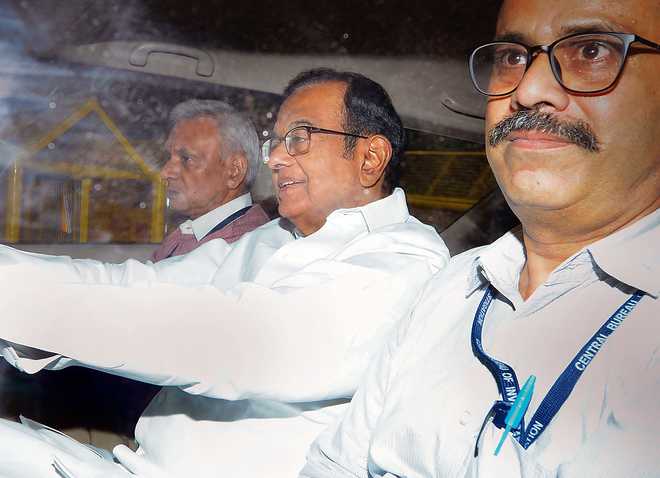
Tall order: P Chidambaram’s case reinforces that investigation and trial are not easy in cases of persons of influence.
GS BAJPAI
Professor, national law university, Delhi
P CHIDAMBARAM’S case, among other things, reinforces that investigation and trial are not easy in cases of persons of influence. This unfolds a drama of contest between power, clout and resources versus the rule of law. The outcome in such cases determines the kind of society and regime we are going to have. This is also about how the criminal justice system deals with the rich and the poor.
Why are our prisons filled with the poor? In his book, The Rich Get Richer and the Poor Get Prison, Jeffrey Reiman contends that the criminal justice system is biased against the poor. The bias is visible in the process of arrest, trial and sentencing. Similar concerns were expressed by the SC in the ongoing Amrapali case, wherein Rs 3,500 crore belonging to thousands of homebuyers was diverted by the group. The SC stated: ‘There are powerful people behind this mess but no matter how powerful they are, we will book them and prosecute them.’
The Unnao rape case provides yet another instance of how the powerful tend to subvert the criminal justice system (CJS) with temerity. The cases and trials of Salman Khan, Sanjay Dutt, Lalit Modi, Navjot Sidhu, Babu Bajrangi, Pappu Yadav, Manu Sharma, Nirav Modi, Vijay Mallya etc. confirm the ability of the rich and powerful to dodge the system.
As per the NCRB, the rate of crime is about 379 per 1 lakh persons. If one goes by the numbers alone, India is a low-crime country. The numbers, however, camouflage much more than they let on. Official crime rates are considered controversial and are regularly contested. Apart from limitations of official statistics, we are also unaware of the figures on crimes by rich and influential persons. The monetary value of one such crime could be equivalent to several hundred other crimes of ordinary nature, thereby obviating the need for novel methods of data collection.
Further, the improbability of identification, investigation, trial and conviction in such crimes ensures that the powerful seldom get tangled in the net of our CJS. Given that such crimes are committed by corporations and elites in conjunction with state bodies and representatives, the CJS is more likely to label the disadvantaged persons who belong to lower socio-economic classes as criminals. Richard Quinney explains the difference between crimes by the rich and powerful and by the poor and oppressed in terms of ‘accommodation’ and ‘dominance’. Crimes of accommodation are committed either for sustenance and socio-economic justice or to cope with conditions of oppression, while crimes of dominance are committed by the rich and privileged who exercise an influence upon who and what gets labelled as deviant or criminal, especially when their own privilege is challenged.
The crimes of the powerful rarely lead to a loss of status or stigmatisation of the perpetrators as they continue to enjoy their status while being out of the clutches of law. Such crimes are not seen as acts or omissions. Instead, they are considered as a resource to encourage their corporations or business regimes. The nature of such deviance is functional and the criminally-enabled persons redefine the meaning of success and achievements in social life. White-collar crimes such as fraud, embezzlement or tax evasion require skills and expertise of a certain degree and cannot be committed by ordinary persons. One needs to be resourceful to perpetrate such crimes. As enunciated by Robert Merton, criminality as a method of material success encourages the use of illegal means to achieve legitimate goals. The only option then is either to exploit or be exploited.
As per available data, 233 MPs or 43% have criminal charges. There is an increase of 109% in 2019 in the number of MPs with declared serious criminal cases since 2009. Crude estimates of black money in India are Rs 150 billion. Over 10 lakh cases of economic offences — generally involving powerful people — were reported in 2016. The number of economic offences consisting of criminal breach of trust, cheating, forgery and counterfeiting in 2016 were around 1.4 lakh, of which 1,070 cases caused a loss of over Rs 1 crore. The rate of charge-sheeting was 51.8% and the conviction rate was only 21% in these cases. The cases of corruption and related offences under the Prevention of Corruption Act were 4,439 in 2016. Conviction and pendency in these cases was 36.8% and 90.6%, respectively. Under the Prevention of the Money Laundering Act, 2,260 cases have been registered in the past decade.
The Law Commission of India, in its 47th report, offered a number of suggestions to improve the investigation and trial of such offences. More recently, the Law Commission, based on Virendra Ohri vs Union of India case, carried out a study of investigation and trial involving influential persons. The SC in this case observed that inordinate delays in the investigation and prosecution of criminal cases involving serious offences, and in the trial of such cases tend to tarnish the justice system. Oft-cited weaknesses of the CJS are effectively exploited by this class of offenders to evade legal action. The police are hesitant to register a case and investigate with full vigour and without influence. Ability of these offenders to corrupt the system is a major conduit to influence the process in their favour. In Ganesh Narayan vs S Bangarappa, the SC observed: ‘The slow motion becomes much slower motion when politically powerful or high and influential persons figure as accused.’ While much criminological research is needed in this area, evidence-based policing and an accelerated system of speedy adjudication is imperative to tackle the problem.
Every lawful action of the criminal justice agencies leading to successful investigation, trial and conviction of the powerful affirms the faith of people in the rule of law.



























